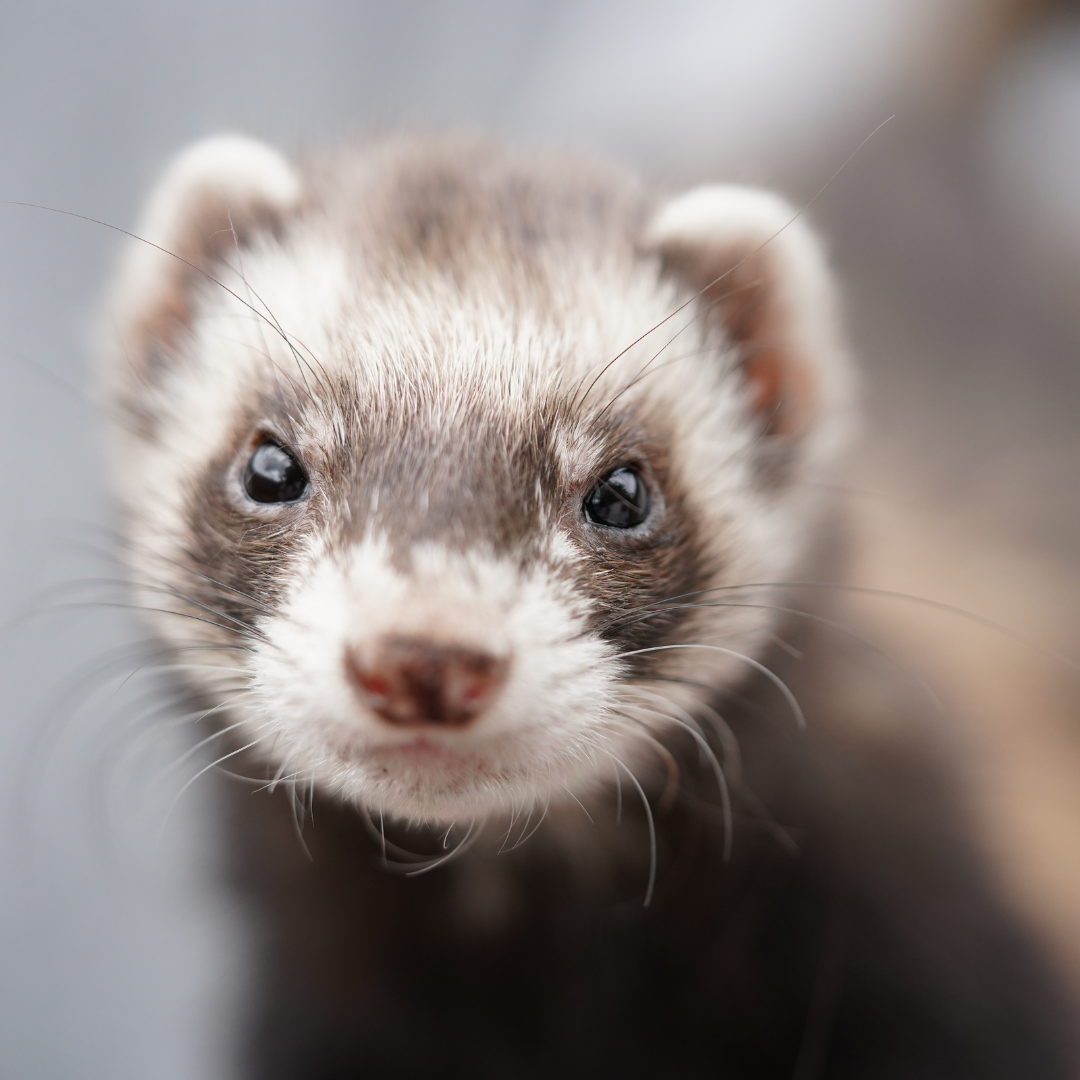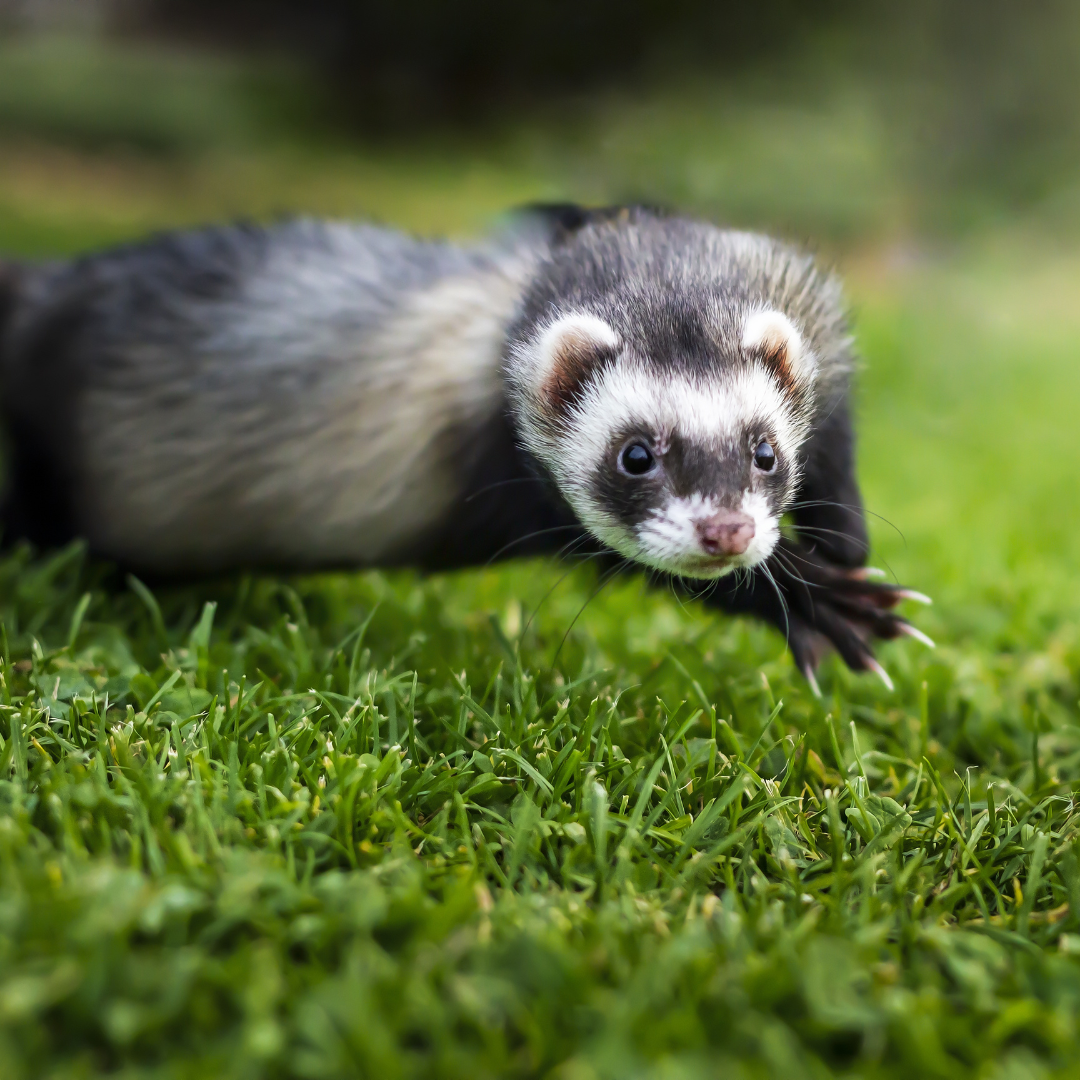Ferrets are inquisitive, playful, intelligent and social animals. They were commonly used for hunting, however in modern times have gained popularity as a domestic house pet. Ferrets make great pets if they are handled correctly from a young age, allowing them to develop a strong bond with their owners. If well cared for ferrets can live between 5-10 years so it’s important to take this into consideration when buying or rehoming a pet ferret.
Ferrets require the right environment, a complete and balanced diet and plenty of love and attention to ensure they are happy and healthy. If you are thinking of adding a ferret to your family here are some important tips about being a responsible pet owner.
“The average size of a pet ferret is between 20-45cm in body length with a weight of 700g-2.5kg. Their long tails can be almost half their body length. The average lifespan of a ferret is 5-10 years.”
Find a local vet
When you get a new pet, it’s important to find a local vet and book a health check. Our vets will not only check your pet ferret’s general health but will also discuss a preventative healthcare routine including vaccinations, parasite control, de-sexing and nail trimming. It is also a great time to ask about any questions you might have such as exercise, dental care and breeding if appropriate.
All pets require a minimum of one health check per year. Regular health checks are a great way to keep your ferret in top shape. They also help your veterinarian to identify and treat any health concerns before they become serious.
Always be on the lookout for slight changes in appetite, toileting behaviour or general habits as changes can be an indicator of a health condition. If you have any concerns about your pet’s health, contact your local vet.
Suitable home
Your ferrets cage should be big enough that they can stretch out, turn around and walk about easily. Their cage must be well ventilated, however also escape proof. Ferrets can squeeze through tight spaces so when selecting or building your cage, make sure the spaces are small enough that they cannot escape and it can be securely closed. Provide the largest enclosure possible to give your pet space to exercise and explore. Cages with multiple levels offer additional space that your pet will enjoy and benefit from.
Ideal cage location
Due to their strong smell, ferrets often live outdoors, but can be kept as indoor pets too. It is important to keep their enclosure out of reach from other animals, weatherproof and away from direct sunlight or draughts. Ferrets should not be continuously confined to their cage. They should be let out each day in a “ferret proof” supervised play area where they can explore and play.
Enrichment devices
Make their cage interesting by providing space to run around, things to play with and areas to explore such as cardboard boxes, paper bags, plastic tubes, tunnels, hard plastic balls, shelving and ramps. This will help keep them entertained. They love crawling through things, so old clothes with long sleeves or pant legs can be great too. Avoid foam or rubber toys, as they will most likely chew them, which can cause an obstruction if swallowed.
Regularly rearrange objects in their cage to keep them entertained and interested.
Sleeping
Ferrets are crepuscular, which means they are most active at dawn and dusk. They like to sleep for approximately 16-20 hours a day. However, when they are awake, they are very active and playful. As ferrets love to nap and sleep, they need a cosy sleeping spot. Bedding such as towels, blankets or old t-shirts can be used to snuggle into. Privacy should be offered with a shelter box lined with a t-shirt or blanket for hiding or resting. A hammock or hanging hideaway up off the ground is also a great idea, giving them another place to relax.
If you are keeping your ferrets outdoors, make sure they have plenty of blankets and insulation to keep themselves warm in the cooler seasons.
Social needs
Ferrets are very social and are generally happiest when kept with other ferrets that they are compatible with. They can live in pairs or small groups, ideally with the same sex or de-sexed males and females to stop them reproducing.
They love to playfully chase and wrestle with each other and bonded ferrets will also snuggle up and sleep together.
Not all pets will like a ferret friend. In the wild, ferrets are predators, so never mix a ferret with other prey species such as rabbits or rodents. Even the scent of a ferret can be extremely stressful for these small animals so they should not live in the same household.
Cleaning the cage
You will need to clean your ferret’s cage regularly. A spot clean should be completed daily which includes scooping out poop and dirty litter, uneaten food and cleaning and refilling their water. A more thorough clean should be completed 1-2 times per week. This includes washing soiled bedding and cleaning the entire cage with hot water or ferret safe disinfectant. Make sure the cage is completely dry before adding the bedding and your pet back into the cage. Ferrets often hide their food, so it’s important to check for this when cleaning so you don’t end up with mouldy food in their cage.
Toilet Training
Ferrets can be litter trained, just like cats! Providing them with a litter box in their cage will contain their toileting waste to one area and make it much easier to clean up after them. If you have more than two ferrets, you will need to add additional litter trays. Most ferrets go the bathroom in the corner so a corner litter tray is best, but you can also use a cat litter tray. Place the litter tray where your ferret likes to go to the toilet.
Fill their litter tray/s with shredded paper or pelleted products. Cedar or pine shavings are not recommended as these can cause respiratory and liver problems. Do not use clay/clumping cat litter, as it can be very dusty and cause breathing problems in ferrets.
Ferrets hate stepping on old pee or poo, so if their litter tray is dirty, they will either go next to it or somewhere else entirely. So, make sure you regularly clean out their tray to encourage good toileting habits.
Diet and nutrition
Ferrets are carnivores, which means they must have animal protein and products in their diet to survive. Your pet ferret must have access to fresh food and water at all times. Their food and water should be placed away from their litter tray to prevent urine or faeces contamination. Food and water bowls should be appropriate to the size of their cage and heavy enough that they cannot easily be upturned and used as a play toy.
To offer a complete and balanced diet your pet ferret will need:
The best diet for a ferret is whole prey foods, such as mice and rats, which is what they would eat in the wild.
The alternative is high protein commercial ferret food (kibble) or a combination of them both.
Ferret treats can include cooked eggs or a small piece of high-quality meat, such as chicken or turkey. Treats should be fed sparingly, only be given as a supplement to their diet, not be the main part. They should make up no more than 10% of their overall diet. Treats are a great tool for training and social interaction with your pet.
There are many foods that can be harmful to their health and cause digestive problems. DO NOT feed your pet ferret chocolate, grapes, raisons, processed meats, vegetables, fruits, grains, dairy products, sweet sugary treats, alcohol or caffeine.
Your ferret will need a constant supply of fresh, clean water. The water will need to be cleaned and changed daily.
Grooming
Ferrets are naturally clean animals and do a great deal of self-grooming. They do not require bathing.
Ferrets are known for their natural musky odour. This is because they have a pair of anal glands with very strong-smelling secretions. They rarely express these anal glands unless they feel threatened. So, washing your ferret will not remove this smell. Many pet ferrets have their anal glands removed at a very young age, through a process called de-scenting.
Remove excess hair by gently brushing your ferret with a soft, bristled brush. If they have dirt on them, you can dampen a face washer with warm water and wipe them over gently. Grooming is a great opportunity to check for cuts, lumps or bumps and is a perfect bonding activity between you and your pet. If their nails are too long, take your ferret to your local vet for a trim. They can teach you in person how to trim your pet’s nails in the future.
Exercise and socialisation
Pet ferrets thrive when given lots of love and attention and opportunities to exercise and play.
Ferrets exercise through play so offer a range of toys in their cage to keep them stimulated including cardboard boxes, paper bags, plastic tubes, tunnels, hard plastic balls, shelving and ramps. They love crawling through things so old clothes with long sleeves or pant legs can be great too. Rotate their toys regularly to keep them challenged and entertained.
Frequent handling and attention is essential to your pets happiness. Enjoy spending time with them each day. Speak with them, play with them, cuddle them and pat them often.
With a little patience ferrets can be trained. Have some fun and teach them some cool tricks such as coming when called, sit, lying down, roll over and beg.
Let them loose by providing daily floor time in an enclosed “ferret safe” space. When they are out of their cage, make sure they are secure and safe from other pets. Keep a watchful eye over them at all times as they love to chew, including electrical wires!
Taming your pet
Your ferret will need to get used to its new family. Help them become familiar with your voice and smell by sitting or lying next to their cage and talking to them with the door open. Watch for cues, if they approach you, gently pat and talk to them. Let your ferret out in a ferret proof room and sit on the floor. Give them a chance to approach you. When they do, gently pat or hand feed them.
When your ferret has your trust and they are comfortable with your touch, pick them up confidently and carefully, with two hands, while supporting their bottom. Use your body to snuggle them into you. Handle them carefully, securely and gently and spend time with them each day and they will become confident in your care and look forward to your company. During playtime teach them to play gently, playtime should end if they bite or play rough.
Preventative Health
Observe the condition of your ferret daily. Any changes in their appetite, toileting behaviour or general habits could be an early indicator of a health condition that requires attention
Ferrets should be vaccinated against distemper at 8 weeks, 12 weeks, then followed by an annual booster.
Ferrets are susceptible to parasites, just like dogs and cats. There are no products made specifically for ferrets so you will need to ask your vet for the most suitable products and dosage requirements that are safe and effective for your ferret.
Ferrets should be desexed at around 6 months of age to prevent unwanted litters. Desexed ferrets are generally less aggressive and have a milder scent. Desexing is particularly important for females as once they are sexually mature and in season, they can stay this way until mated which can lead to health issues.
If you have any concerns about your ferret’s health, contact your local vet.











